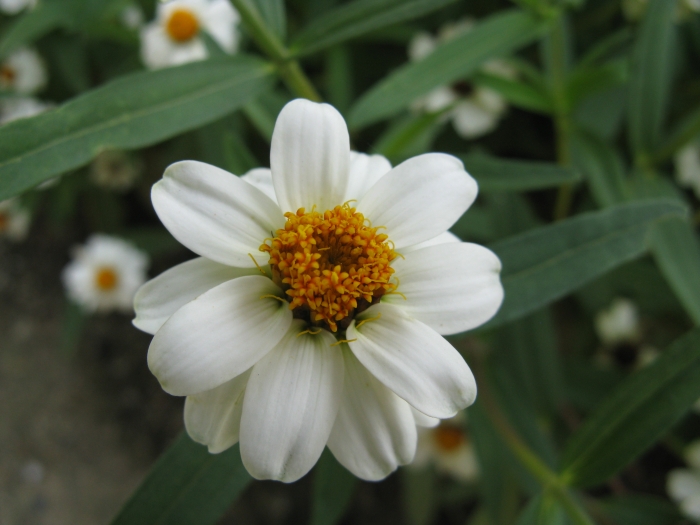Narrowleaf Zinnia
(Zinnia angustifolia)
Narrowleaf Zinnia (Zinnia angustifolia)
/
/

KENPEI
CC BY 3.0
Image By:
KENPEI
Recorded By:
Copyright:
CC BY 3.0
Copyright Notice:
Photo by: KENPEI | License Type: CC BY 3.0 | License URL: https://creativecommons.org/licenses/by/3.0 | Uploader: KENPEI | Publisher: Wikimedia Commons | Title: Zinnia_angustifolia_'Pette_Land_White'2.jpg | Notes: |











Estimated Native Range
Summary
Zinnia angustifolia, commonly known as Narrowleaf Zinnia, is an annual herb that can sometimes behave as a perennial in warmer climates. It is native to scrub and dry grasslands in the southwestern United States, northern Mexico, and Central America. This plant typically grows up to 50 cm (20 inches) tall with a bushy growth habit due to its many-branched stems. The foliage is characterized by its rough texture with short hairs. Narrowleaf Zinnia is notable for its floral display, featuring heads of flowers with mostly hemispheric involucres, usually less than 1 cm high or wide. The flowers exhibit bright orange or sometimes yellow ray corollas, and cultivated varieties offer a spectrum of colors including white and various other hues. Flowering occurs throughout the summer months and the blooms are highly attractive to pollinators such as butterflies and bees.
Narrowleaf Zinnia is valued for its drought tolerance and vibrant flowers, making it a popular choice for xeriscaping, rock gardens, and as a colorful addition to borders. It thrives in full sun and can adapt to a range of soil types, provided they have good drainage. While it requires low to medium amounts of water, it is important to avoid overhead watering to reduce the risk of fungal diseases like powdery mildew. Deadheading spent flowers can encourage prolonged blooming. In areas where it is not winter hardy, it can be grown as an annual or propagated from seeds each year.CC BY-SA 4.0
Narrowleaf Zinnia is valued for its drought tolerance and vibrant flowers, making it a popular choice for xeriscaping, rock gardens, and as a colorful addition to borders. It thrives in full sun and can adapt to a range of soil types, provided they have good drainage. While it requires low to medium amounts of water, it is important to avoid overhead watering to reduce the risk of fungal diseases like powdery mildew. Deadheading spent flowers can encourage prolonged blooming. In areas where it is not winter hardy, it can be grown as an annual or propagated from seeds each year.CC BY-SA 4.0
Plant Description
- Plant Type: Herb
- Height: 0.8-1.5 feet
- Width: 0.8-1 feet
- Growth Rate: Rapid
- Flower Color: Orange, Pink, White, Yellow
- Flowering Season: Summer, Fall
- Leaf Retention:
Growth Requirements
- Sun: Full Sun
- Water: Low, Medium
- Drainage: Medium
Common Uses
Bee Garden, Bird Garden, Border Plant, Butterfly Garden, Deer Resistant, Drought Tolerant, Groundcover, Hummingbird Garden, Low Maintenance, Potted Plant, Rabbit Resistant, Salt Tolerant, Showy Flowers, Street Planting
Natural Habitat
Native to scrub and dry grasslands in the southwestern United States, northern Mexico, and Central America
Other Names
Common Names: Little Star, Schmalblättrige Zinnie, Dvärgzinnia
Scientific Names: , Zinnia angustifolia, Crassina angustifolia, Zinnia linearis subsp. linearis,
GBIF Accepted Name: Zinnia angustifolia Kunth